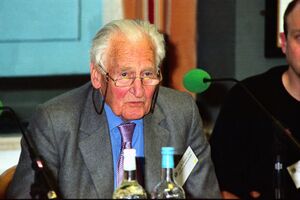Richard Doll
(physician, epidemiologist, Key Opinion Leader) | |
|---|---|
 | |
| Born | 28 October 1912 Hampton, Middlesex, England |
| Died | 24 July 2005 (Age 92) Oxford, England |
| Nationality | UK |
| Alma mater | King's College London |
| Exposed | Tobacco |
| Interests | • Monsanto • Agent Orange • Big Chemical • vinyl chloride |
Lionized medical expert who received large consultancy fees from Monsanto and other chemical companies for more than 20 years while "investigating" cancer risks in the industry. | |
Sir William Richard Shaboe Doll was a British physician who became an epidemiologist in the mid-20th century and made important contributions to that discipline. He became a hero for many in the medical community for his pioneer work linking smoking to health problems.[1]
He secretly received large consultancy fees from Monsanto and other chemical companies for more than 20 years while "investigating" cancer risks in the industry.[2]
Official narrative
In collaboration with Professor Bradford Hill, he developed statistics that proved the connection in 1950.[3] Doll himself quit smoking then. He then studied doctors' smoking habits and came to the conclusion that when one quits smoking, the risk of cancer decreases immediately.[4] For this work, he is a hero to many within the medical profession.[5]
Shill for Chemical Industry
Doll was also paid $1,500 a day, for twenty years by Monsanto, possibly a total of eleven million dollars.[2][1]
He was also paid a £15,000 fee by the Chemical Manufacturers Association and two other major companies, Dow Chemicals and ICI, for a review that largely cleared vinyl chloride, used in plastics, of any link with cancer. Sir Richard's review was used by the manufacturers' trade association to defend the chemical for more than a decade.[2]
While he was being paid by Monsanto, Sir Richard wrote to a royal Australian commission investigating the potential cancer-causing properties of Agent Orange, made by Monsanto and used by the US in the Vietnam war. Sir Richard said there was no evidence that the chemical caused cancer. He was also an expert witness for Solutia, a chemical business spun off from Monsanto, as late as year 2000.[2]
Defenders
Sir Richard Peto, the Oxford-based epidemiologist who worked closely with him, said the allegations "came from those who wanted to damage Sir Richard's reputation for their own reasons."[2]
Professor John Toy, medical director of Cancer Research UK, said times had changed and the accusations must be put into context. "His pioneering work demonstrated the link between smoking and lung cancer and paved the way towards current efforts to reduce tobacco’s death toll," he said. "In the days he was publishing it was not automatic for potential conflicts of interest to be declared in scientific papers."[2]
References
- ↑ a b https://drmalcolmkendrick.org/2023/01/12/what-is-corruption-and-why-does-it-matter-so-much/
- ↑ a b c d e f https://www.theguardian.com/science/2006/dec/08/smoking.frontpagenews
- ↑ https://www.ncbi.nlm.nih.gov/pmc/articles/PMC2038856
- ↑ https://www.ncbi.nlm.nih.gov/pmc/articles/PMC2085438
- ↑ https://www.theguardian.com/commentisfree/2006/dec/10/comment.science